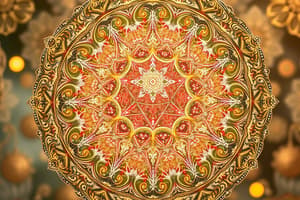Podcast
Questions and Answers
Why is rubidium more reactive than potassium?
Why is rubidium more reactive than potassium?
- Rubidium has more protons than potassium.
- Rubidium has a higher atomic number than potassium.
- Rubidium has a greater tendency to lose electrons than potassium. (correct)
- Rubidium forms stronger ionic bonds than potassium.
What is a common observation that shows rubidium is more reactive than potassium?
What is a common observation that shows rubidium is more reactive than potassium?
- Rubidium tarnishes more quickly in air compared to potassium.
- Rubidium forms fewer compounds than potassium in general.
- Rubidium reacts vigorously with water, producing more heat and hydrogen gas than potassium. (correct)
- Rubidium has a lower reactivity towards halogens than potassium.
Which statement is correct about the noble gases?
Which statement is correct about the noble gases?
- The noble gases have molecules with two atoms.
- The noble gases have boiling points that increase going down the group. (correct)
- The noble gases react with metals to form ionic compounds.
- The noble gases all have atoms with eight electrons in the outer shell.
Which isotopic mass number of neon has the highest percentage abundance?
Which isotopic mass number of neon has the highest percentage abundance?
In electrolysis of molten sodium chloride to produce sodium, what is the correct half equation for the production of sodium?
In electrolysis of molten sodium chloride to produce sodium, what is the correct half equation for the production of sodium?
What is a key difference between rubidium and potassium in their reactivity?
What is a key difference between rubidium and potassium in their reactivity?
What is the purpose of using a mesh to keep the products of electrolysis apart?
What is the purpose of using a mesh to keep the products of electrolysis apart?
In the electrolysis of molten sodium chloride, which type of particle passes through the mesh?
In the electrolysis of molten sodium chloride, which type of particle passes through the mesh?
Which two ions are present in aqueous sodium chloride solution, in addition to sodium and chloride ions?
Which two ions are present in aqueous sodium chloride solution, in addition to sodium and chloride ions?
What is the alkaline solution produced during the electrolysis of aqueous sodium chloride?
What is the alkaline solution produced during the electrolysis of aqueous sodium chloride?
In the reaction 2C(s) + SiO2(s) → Si(s) + 2CO(g), what does this reaction indicate about the position of silicon in the reactivity series?
In the reaction 2C(s) + SiO2(s) → Si(s) + 2CO(g), what does this reaction indicate about the position of silicon in the reactivity series?
What happens when an atom loses an electron in an electrolytic cell?
What happens when an atom loses an electron in an electrolytic cell?
Which section of the periodic table in Figure 1 is most likely to contain element Q?
Which section of the periodic table in Figure 1 is most likely to contain element Q?
Which section of the periodic table in Figure 1 is most likely to contain element R?
Which section of the periodic table in Figure 1 is most likely to contain element R?
What are two differences between the physical properties of Group 1 elements and transition elements?
What are two differences between the physical properties of Group 1 elements and transition elements?
What type of bonding is typically found in compounds formed between metals and non-metals?
What type of bonding is typically found in compounds formed between metals and non-metals?
Describe what happens when a magnesium atom reacts with an oxygen atom, with reference to electrons.
Describe what happens when a magnesium atom reacts with an oxygen atom, with reference to electrons.
What happens when sodium carbonate reacts with hydrochloric acid in an exothermic reaction?
What happens when sodium carbonate reacts with hydrochloric acid in an exothermic reaction?
Flashcards are hidden until you start studying



